Toyota Grand Highlander vs Toyota Highlander: Compare 3-row SUVs
With the launch of the 2024 Toyota Grand Highlander, Toyota now has as many three-row SUVs as they have rows: three. Add the Sienna minivan to the full-size Sequoia, the Grand Highlander, and the smaller Highlander, and Toyota offers a family of vehicles for shoppers in the family way. The Grand Highlander might be the best.
Larger, wider, taller, and with a roomier third row, the 2024 Grand Highlander rights the wrongs of the smaller Highlander and also offers more functional seating than the compromised setup in the larger full-size Toyota Sequoia.
Those aren’t the only differences. The Grand Highlander comes in only three trims compared to the six grades offered in the Highlander. It steers shoppers toward better albeit more expensive features. It’s also the only Highlander to be offered with the most powerful Hybrid Max powertrain. And it looks more sophisticated than the standard Highlander.
What follows is a breakdown of the key differences between the two Highlanders, and why the Grand Highlander is the best Highlander yet.
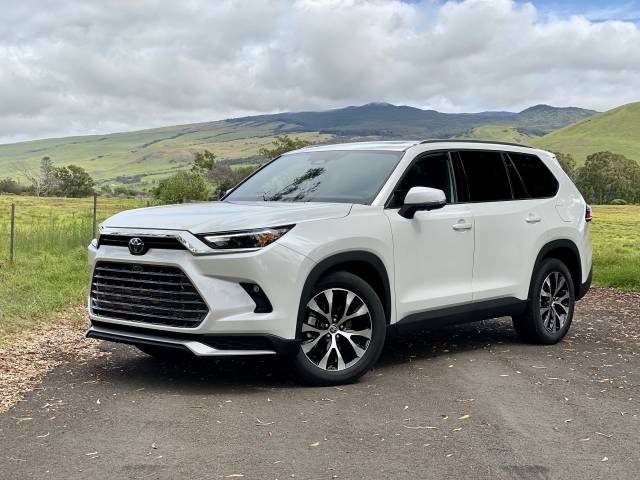
2024 Toyota Grand Highlander
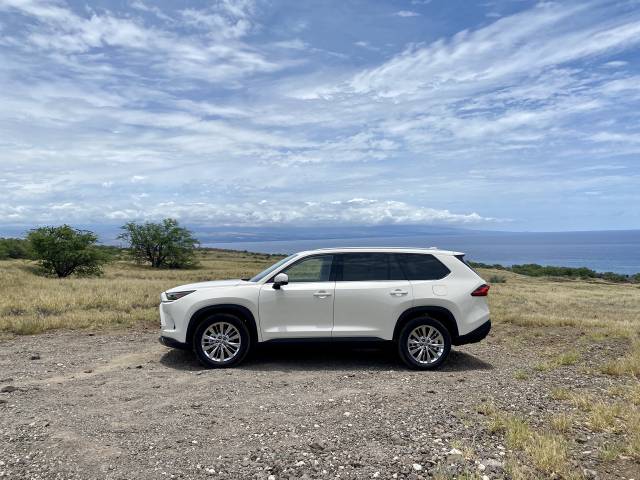
2024 Toyota Grand Highlander
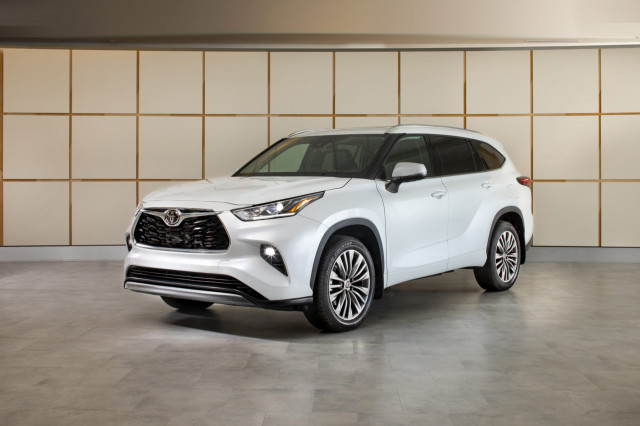
2023 Toyota Highlander
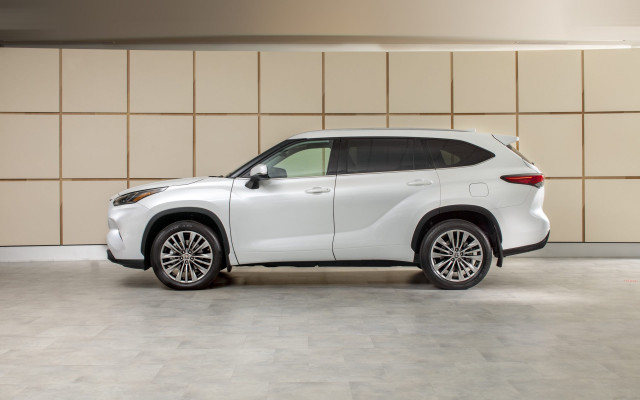
2023 Toyota Highlander
How much bigger is the Grand Highlander than the Highlander?
Grand Highlander is 201.4 inches long, versus 194.9 inches in the Highlander
Grand Highlander is 2.3 inches wider and 2.0 inches taller
Both have a ground clearance of 8.0 inches
The biggest difference between the two Highlanders comes down to size. It stretches 6.5 inches longer, grows 2.3 inches wider, and stands 2.0 inches taller, though both have a ground clearance of 8.0 inches, so getting in and out is no different. Most notably, the Grand Highlander has a 3.9-inch longer wheelbase than the standard Highlander. That translates to more passenger and cargo room.
Advantage: Grand Highlander.
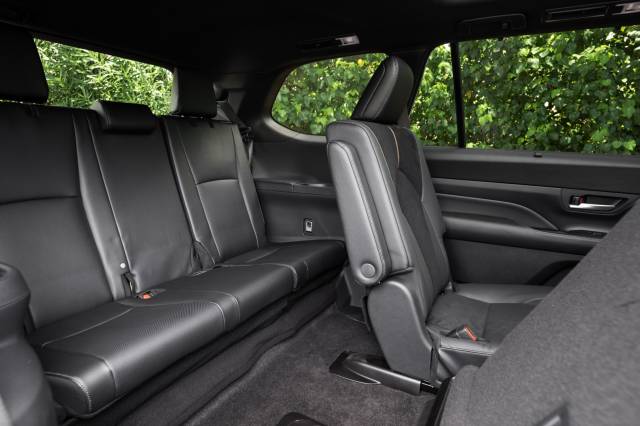
2024 Toyota Grand Highlander
How does passenger and cargo space compare in the Highlanders?
Grand Highlander passenger volume is 153.3 cubic feet versus 141.3 cubic feet in the standard Highlander
Grand Highlander has 20.6 cubic feet of space behind row three versus 16.0 cubic feet in the Highlander
Both seat up to eight passengers but the Grand Highlander comes standard with captain’s chairs and a seven-passenger configuration
Passengers should appreciate the roominess of the Grand Highlander, but it’s not roomier everywhere. There are 41 inches of legroom in the second row in Highlander models, but 39.5 inches in the Grand Highlander. It would be hard to tell the difference without a spec sheet, however.
Whether in hybrid or gas-only models, the second-row seats sit about four inches higher than the floor. In hybrid models, the battery pack sits beneath the second-row seats. In either case, the floor in the third row rises up to the same height so third-row passengers’ knees sit higher and it could tire out hips and legs more easily on long road trips.
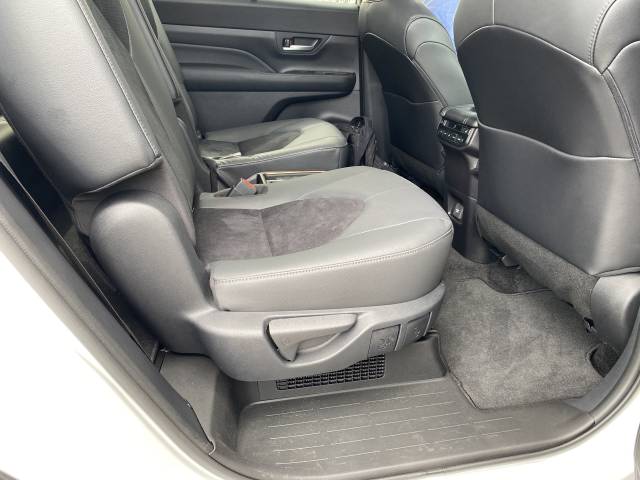
2024 Toyota Grand Highlander
There’s much more space in the third row of the Grand Highlander, with 33.5 inches of rear legroom compared to 27.7 inches in the standard Highlander. The raised floor makes toeroom tight, but it’s easily remedied by the mid-row passenger sliding forward their seat an inch or two. Shoulder and hip room accommodates two average-sized adults without rubbing any body parts, and the shaggy do popular with teens won’t scrape the headliner, even with the panoramic sunroof on the Grand Highlander. It’s much tighter in back in the standard Highlander. It’s fine for carpool duty, but stick anyone but a grade schooler back there for a road trip and there might be a mutiny. Dual cup holders on either side over the wheel well calm the mates in either model, but the Grand Highlander has USB ports to staunch the flow of “Are we there yet?” from the wayback.
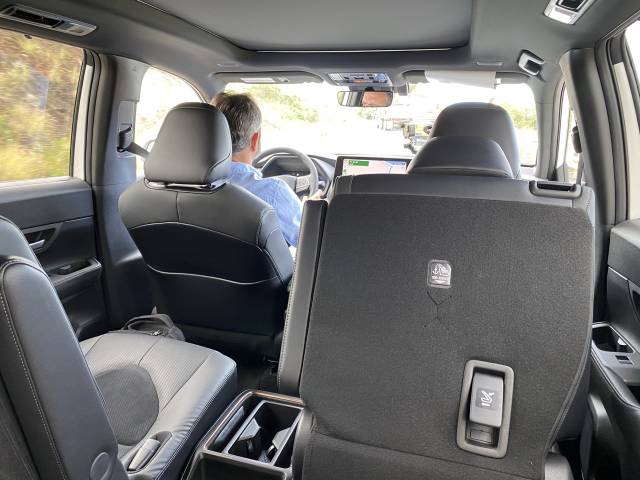
2024 Toyota Grand Highlander
To get out of the third row, passengers pull a seat top latch in either model. It requires some dexterity that might evade smaller hands, and it’s not as simple as the push-button release used in other rivals such as the Honda Pilot. Entering the third row, there are two levers to either slide the second-row seat forward or collapse it flat.
Cargo space behind the third row also favors the Grand Highlander, at 20.6 cubic feet compared to 16.0 cubic feet in the standard Highlander. A jogging stroller could fit in the Grand Highlander, or a couple sets of golf clubs, or a run to Costco can be indulged in without having to fold flat the 60/40-split third row. In either model, the pull straps automatically collapse the headrests. With the third row collapsed and a flat floor, the Grand Highlander’s advantage expands with volume increasing to 57.9 cubes compared to 48.4 in the standard Highlander. Collapse the second row and the advantage grows to 97.5 cubes versus 84.3 cubes. We didn’t have a sheet of 4×8 plywood to test, but we’d recommend the Sequoia or Sienna for that need. Or a proper truck.
Advantage: Grand Highlander.
Grand Highlander vs. Highlander interior and exterior design
The Grand Highlander smooths out the sides for a more sophisticated look
The Highlander wears Sienna sides with a snarling face
Grand Highlander cockpit appears more cohesive
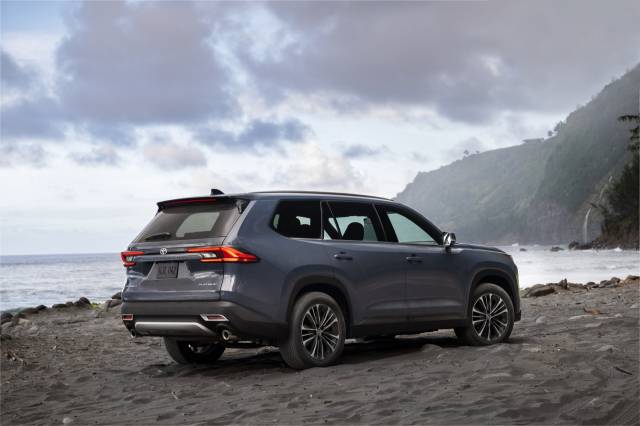
2024 Toyota Grand Highlander
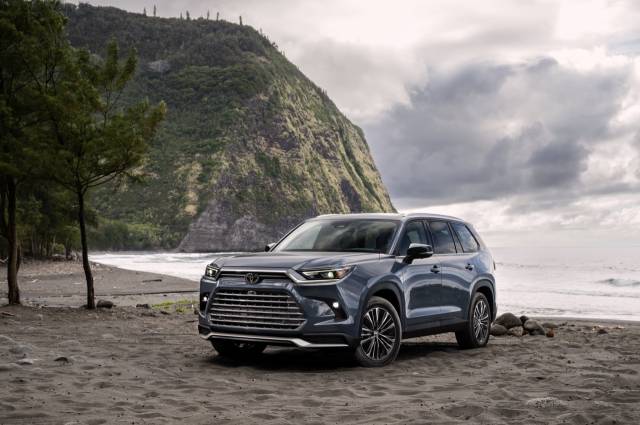
2024 Toyota Grand Highlander
Is the Grand Highlander a good-looking SUV?
We think so. Its smooth body sides, boxy fenders, and calmer front fascia project sophistication compared to the Highlander. The Grand Highlander eschews the bulges of the trucky Toyota Sequoia and leans into the Lexus side of things, fronted by a large lower grille that tapers up like the Lexus spindle grille. It’s flanked by pert fog lights, then cut off at the waist by a bar and badge bridging the LED headlights. Daytime running lights make eyebrows in the headlight housing.
Besides a scallop above the rocker panel, it’s a smooth plane down to the rear, with a beltline uptick into the rear quarter winders that gives rear-seat occupants plenty of outward vision. Both versions have integrated rear roof spoilers, and the Grand Highlander’s Hybrid Max models sport dual exhaust tips and roll on black 20-inch wheels.

2023 Toyota Highlander
Is the Highlander a good-looking SUV?
It sharpens an edge in the bloated class of anodyne three-row crossover SUVs, but it might be trying too hard. The lower grille stretches to the corners in a pout, and the upper grille flares like a bull’s nose. The menacing impression doesn’t flow with the rest of the crossover. Down the sides, a body bulge leads from the lower front wheel over the rocker panels and swoops up over the rear fender. It might stand out more if it weren’t the same take as on the Sienna, sliding doors be damned.
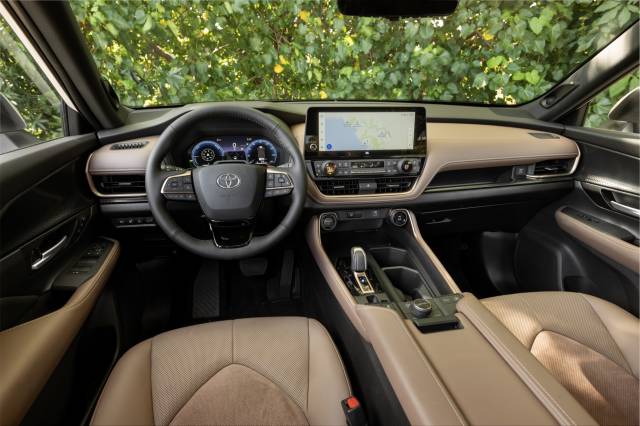
2024 Toyota Grand Highlander
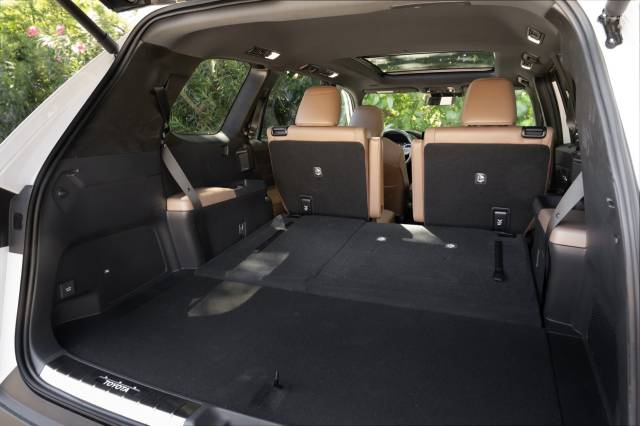
2024 Toyota Grand Highlander
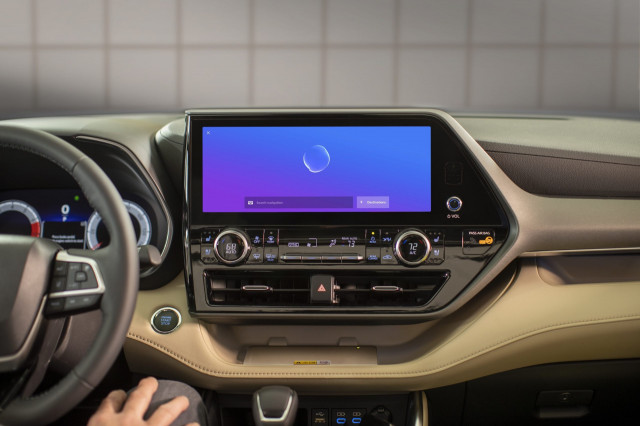
2023 Toyota Highlander
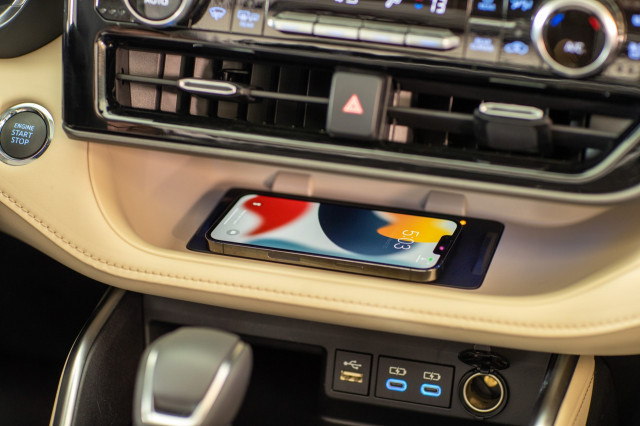
2023 Toyota Highlander
How do the interiors compare?
The siblings relate more on the inside, prioritizing smart storage spaces such as a passenger shelf for smartphones above the glove box. Bronze accents on the dash and console pop on either model, but the Grand Highlander benefits from newness with an open bridge console for more storage space and an electronic gear shifter that takes up a lot less space than the mechanical shifter in the Highlander. The available 12.3-inch touchscreen is better integrated with the dash and console of the Grand Highlander, and sticks out less like an aftermarket add-on than in the Highlander. The available wireless smartphone charging pad in the Highlander is more accessible below the vents than the one wedged where the console meets center stack in the Grand Highlander.
Advantage: The Grand Highlander looks the part of Grand.
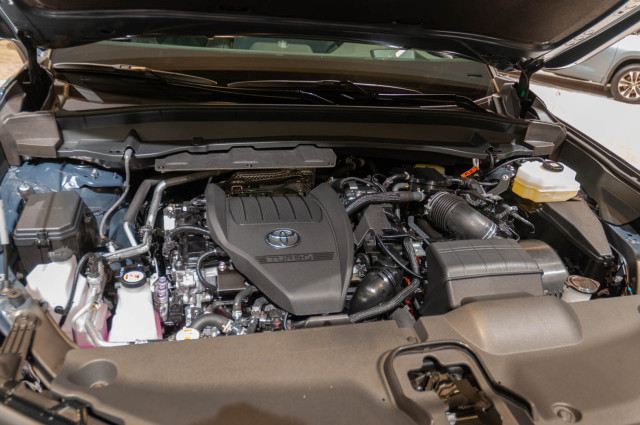
2024 Toyota Grand Highlander
Toyota Highlander and Grand Highlander performance and towing
Base 265-hp 2.4-liter turbo-4 with an 8-speed automatic transmission
Optional 243-hp 2.5-liter inline-4 hybrid system with two or three motors
Grand Highlander exclusive Hybrid Max with a 362-hp turbo-4 hybrid system
The Highlander and Grand Highlander share the same base and hybrid powertrains, but the Grand Highlander can be equipped with Toyota’s Hybrid Max powertrain derived from the Crown sedan and used in other applications, ranging from trucks to SUVs.
Base 2.4-liter turbo-4
Base versions of both Highlanders share a 2.4-liter turbo-4 also used in the base 2024 Toyota Tacoma. It makes 265 hp and 310 lb-ft of torque. Paired with an 8-speed automatic in front- or available all-wheel drive, it’s louder than the hybrids but all that torque comes on early to give it plenty of grunt for passing moves. The Grand Highlander goes 0-60 mph in 7.5 seconds. It’s rated to tow 5,000 pounds.
Optional 2.5-liter inline-4 hybrid
In either model, a 2.5-liter inline-4 and two front motor generators team up to make 243 hp and 175 lb-ft, while a nickel-metal-hydride battery pack allows the system to juggle energy for more efficiency and power. Hybrid AWD models add a third motor at the rear to provide power on its own. It can run in EV mode at speeds up to about 15 mph, but the powertrain can strain uphill or when demanded. It’s the most efficient choice, but also the pokiest, with a 0-60 mph time of 7.9 seconds. It can tow up to 3,500 pounds, but we would recommend avoiding coming near that amount.
Grand Highlander Hybrid Max
Exclusive to the Grand Highlander, the Hybrid Max powertrain pairs the 2.4-liter turbo-4 with two motors supplementing power to the front and rear axle via a 6-speed automatic transmission and a mechanical driveshaft. Making 362 hp and 400 lb-ft, it prioritizes power as well as efficiency, and gives the Grand Highlander some muscle lacking in other Highlanders. It hits 60 mph in 6.3 seconds. It hauls. The full-time all-wheel-drive system shifts the torque between the axle based on driver inputs and modes, so Sport mode has more rear axle torque for better takeoff, and Snow or Rock & Dirt modes have low-speed torque more evenly apportioned.
Advantage: The Grand Highlander has a third option, giving it the advantage of choice.
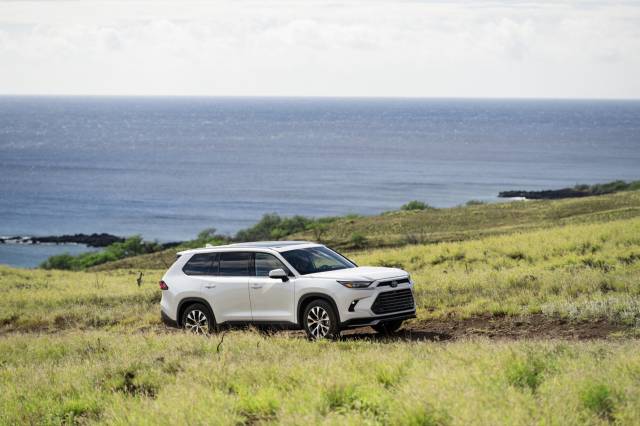
2024 Toyota Grand Highlander
Grand Highlander vs Highlander fuel economy
Highlander hybrid tops out at 36 mpg combined or 35 mpg with AWD
Grand Highlander hybrid checks in at 34 mpg combined, with FWD or AWD
Grand Highlander Hybrid Max aspires for 27 mpg combined
Is the Highlander good on gas?
Highlander hybrids are exceptional at fuel economy, and are the most efficient three-row crossover SUVs on the market without a plug. Front-wheel-drive hybrids earn EPA ratings of 36 city, 35 highway, 36 combined mpg, or 35/35/35 mpg with all-wheel drive.
The base turbo-4 in the standard Highlander rates at 22 mpg city, 29 highway, 25 combined with front-wheel drive, or 21/28/24 mpg in AWD. That’s more efficient than the V-6 in rivals.
Is the Grand Highlander good on gas?
Its larger size and feature-laden trims lower fuel economy by about 1 mpg, on average. The turbo-4 with FWD rates at 21/28/24 mpg, and AWD costs it 1 mpg. The Grand Highlander hybrid checks in at 36/32/34 mpg, regardless of FWD or AWD.
Balancing power and efficiency, the Grand Highlander Hybrid Max with standard AWD checks in at 26/27/27 mpg. Our testing failed to come close to that, however, and resulted with a rating more in line with the turbo-4.
Advantage: The smaller Highlander.
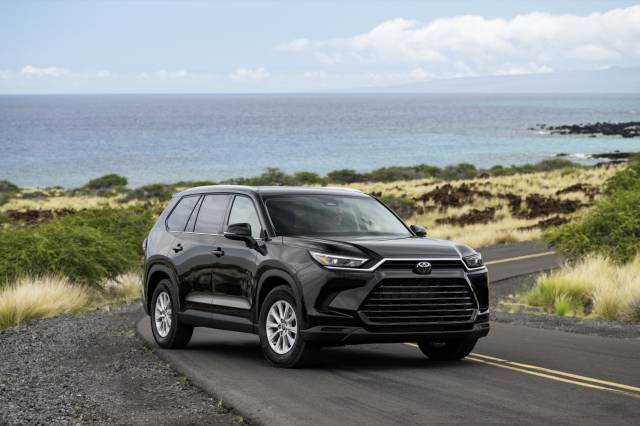
2024 Toyota Grand Highlander
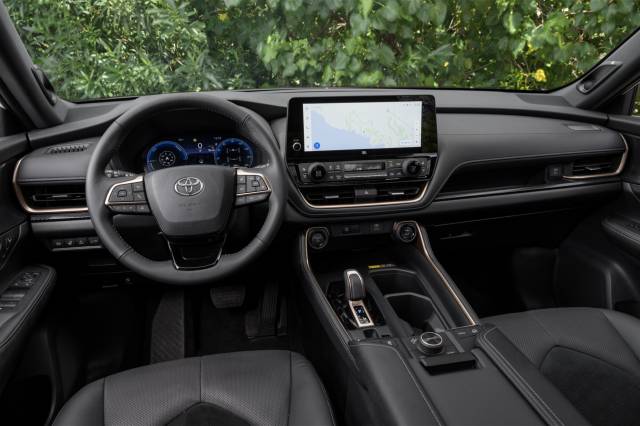
2024 Toyota Grand Highlander
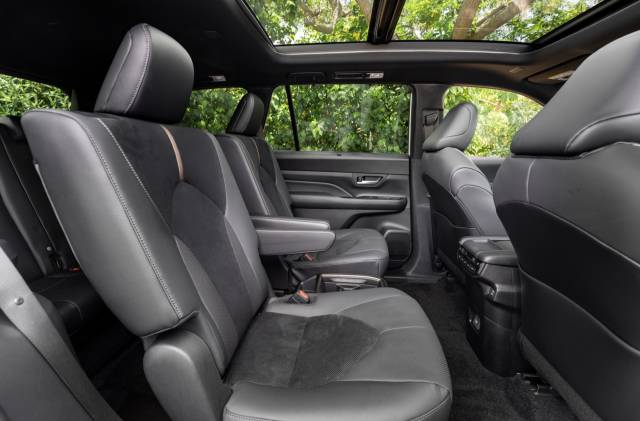
2024 Toyota Grand Highlander
Toyota Grand Highlander vs. Highlander price and trims
Base Highlander L costs about $38,000 (including destination)
Base Grand Highlander XLE costs about $44,400
Highlander XLE costs about $43,400
AWD adds $1,600 on either model
Hybrid upcharge is $1,600 on average, depending on trim
Best picks: Highlander XLE, Grand Highlander XLE
Which Grand Highlander should I buy?
Sold only in XLE, Limited, and Platinum trims, the Grand Highlander leans into the premium territory occupied by Lexus. The base XLE does the trick for $44,405, and comes with standard features such as a 12.3-inch touchscreen with wireless Apple CarPlay and Android Auto, a wireless phone charger, synthetic leather upholstery, power front seats that are heated, seven USB ports, a power tailgate, and it rolls on 18-inch alloy wheels.
Adding popular features such as AWD and the hybrid powertrain brings the price to about $47,600. That’s a good value.
The Hybrid Max with standard AWD starts off in Limited trim above $55,000, and nears $60,000 in top Platinum models. It has a panoramic sunroof, heated and cooled front and second-row seats, a surround-view camera system, and a head-up display. That’s a lot for a Highlander, regardless of how Grand it might be.

2023 Toyota Highlander
Which Highlander should I buy?
The Highlander casts a wider net, with L, LE, XLE, XSE, Limited, and Platinum trims. The $37,955 Highlander L carries an 8.0-inch touchscreen with Apple CarPlay and Android Auto, a power driver seat, cloth upholstery, and 18-inch wheels. The $43,400 XLE strikes us as the best balance between value and features, with the same equipment listed above for the Grand Highlander.
Advantage: The Grand Highlander XLE is worth the extra grand.
The 2024 Toyota Highlander earns a TCC Rating of 7.0 out of 10, buoyed by the new Grand Highlander. It’s roomier, better equipped, and more attractive, and it’s only $1,000 more expensive than a similarly equipped Highlander. Toyota only offers it on the top half of trims, however, so it might strain a shopper’s budget. But it’s the better Highlander.

